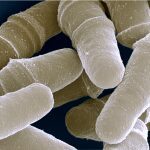Link to Pubmed [PMID] – 9135148
EMBO J. 1997 Mar;16(6):1332-41
Fission yeast p56(chk1) kinase is known to be involved in the DNA damage checkpoint but not to be required for cell cycle arrest following exposure to the DNA replication inhibitor hydroxyurea (HU). For this reason, p56(chk1) is considered not to be necessary for the DNA replication checkpoint which acts through the inhibitory phosphorylation of p34(cdc2) kinase activity. In a search for Schizosaccharomyces pombe mutants that abolish the S phase cell cycle arrest of a thermosensitive DNA polymerase delta strain at 37 degrees C, we isolated two chk1 alleles. These alleles are proficient for the DNA damage checkpoint, but induce mitotic catastrophe in several S phase thermosensitive mutants. We show that the mitotic catastrophe correlates with a decreased level of tyrosine phosphorylation of p34(cdc2). In addition, we found that the deletion of chk1 and the chk1 alleles abolish the cell cycle arrest and induce mitotic catastrophe in cells exposed to HU, if the cells are grown at 37 degrees C. These findings suggest that chk1 is important for the maintenance of the DNA replication checkpoint in S phase thermosensitive mutants and that the p56(chk1) kinase must possess a novel function that prevents premature activation of p34(cdc2) kinase under conditions of impaired DNA replication at 37 degrees C.

